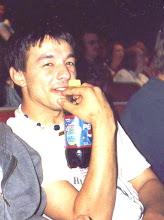War on drugs often frustrating (Minnesota)
But it's just part of the job for law enforcement
Jim Romsaas
Mesabi Daily News
Saturday, November 11th, 2006 09:29:39 PM
The 2004 kidnapping and murder of an Embarrass man is a tragic example of just how violent drug-related crimes in the area can be.
Area law enforcement authorities continue to fight the “epidemic’’ known as methamphetamine and admit being frustrated at times by seeing both the number of related crimes and the costs to combat them continue to rise.
However, that doesn’t stop them from continuing the war on drugs, which now includes a Drug Court (an alternative to the traditional punishment of drug users).
“We’re accustomed to frustration,’’ said John Malovrh, supervising deputy for the St. Louis County Sheriff’s Department in Virginia. His office is so deluged with cases, the investigators take what is there and run with it, he said, which doesn’t leave much time for developing strategies against drugs.
Story Continues Below
Gilbert Police Chief Mark Skelton dealt with the impact firsthand after Travis Holappa was kidnapped from his town and killed more than two years ago.
The Gilbert Police Department incurred overtime costs of about $15,000 from just that one case. “That is a huge burden on our communities,’’ Skelton said.
Spending that much time on an investigation also takes quite a toll on a five-person department, he said, but “it’s just something you have to do.’’
“It’s warranted,’’ according to Skelton. “You have to get to the bottom of it.’’
In Eveleth, the battle against drugs taxes police department resources to the extreme, said Police Chief Brian Lillis. If the officers aren’t building a case, he said, then they are involved in a case they are prosecuting.
“It continues to be a problem, particularly with meth crimes,’’ Lillis said. “It has progressively worsened over the years.’’
Lillis is dealing with much the same obstacles regarding labor costs. “There’s a limited amount of overtime expenditures,’’ he said, and that part of the budget is “strained to the max.’’
Offsetting that slightly are his employees donating their time to the cause, he added.
But the frustration does return on a regular basis.
When Skelton thinks there is a lull in activity, the bottom drops out of it. Three cases will be taken care of, for example, and then three more will pop up. He and his officers don’t know if they are gaining ground.
“We just can’t quit on it,’’ Skelton said.
“Without a doubt, it taxes the staff,’’ said Steve Borchers of the Boundary Waters Drug Task Force. The Sheriff’s Department just doesn’t have the ability to fight the war at this level of staffing, he said.
That’s where the Task Force comes in, Malovrh said. The Boundary Waters group is focused on the rising number of drug crimes.
“It’s definitely an epidemic,’’ said Sgt. Drew High of the Sheriff’s Department. The burglaries, thefts and assaults the department sees every day are 70 percent related to methamphetamine, he said. “You get to meth somewhere along the line’’ in investigating these cases.
While law enforcement feels some frustration, area residents do as well. Rampant vandalism and thefts are reported regularly, as are some residents’ reactions.
In Virginia, for example, a resident woke up to find all the decorative frogs and fountains that decorated their yard missing. Their response: A sign that says, “Thanks for Stealing.’’
One answer the area is looking at is the Iron Range Drug Court.
The Drug Court will work with low-level, non-violent persons (with addictive situations who have been convicted) to work through a program including weekly court and other visits to become and stay free of meth use and other drugs.
Malovrh supports the Drug Court because the crime fighting effort needs a many-sided effort. His department also has a voice in the people who will go through the Drug Court, he said.
“We’ll do whatever we can to help them in their effort,’’ Malovrh said.
Lillis is also on board with the idea. Certain individuals would be better served by being treated for their problem, he said.
Prevention and treatment are just as important as the punishment side, Skelton added. “We have to find a way to help them.’’
Borchers would also like to see the state’s laws changed to deal with the meth epidemic. “We need an ingestion law,’’ he said.
That would be a tool that gets people treatment at an earlier time, said Borchers, who previously worked in California where they already have ingestion laws. In this area, many people who have ingested meth are taken to the local emergency room instead of going through the criminal system.
While the meth-related crimes are on the rise, local law enforcement agencies are not standing still.
The Boundary Waters Drug Task Force continues to evolve, Malovrh said. In 2007, the BWDTF will no longer include the Koochiching and Itasca Sheriff’s Departments or the Grand Rapids and International Falls police.
He said the geographical area has been pared down to St. Louis County and the Virginia, Eveleth, Gilbert and Hibbing police departments. The bigger area was just unmanageable, he added.
As far as the other counties, Malovrh said they will most likely team up with agencies in their own areas.
The local departments are also cooperating more than they ever have, according to Skelton. Officials from city to city simply can’t afford to be parochial, he said, because “drug dealers aren’t parochial.’’


0 Comments:
Post a Comment
Subscribe to Post Comments [Atom]
<< Home